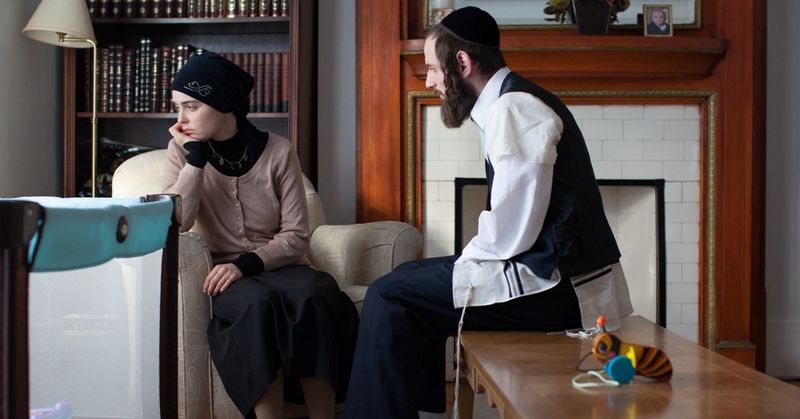
“Félix and Meira”: Flawed Flick Worth Watching
In a Venetian gondola, with Félix at her side, Meira cradles her daughter and apologizes to the infant. That moment acknowledges that leaving the Hasidic community is simultaneously an act of liberation and a grievous loss. It would have been easy to set up traditional Jewish life as a mere anachronistic foil to romantic, progressive, secular culture, but “Félix and Meira” refuses to follow such a cheap and conventionalized script.
The parallels between Meira and Félix help to short circuit the culture wars narrative. To be sure, Felix initially represents cosmopolitan knowledge and “normal” life to Meira. He provides her with her first pair of jeans, a costume change that symbolizes a reorienting of her—and his—relationship to her body. Similarly, he takes her to a Latin club and attempts to show her the moves of which her newly awakened body is capable. To her—and initially to the viewers’ eyes—Félix is the mentor and Meira the mentee. However, in an admittedly jarring but telling scene, the regular male dancers in the club converse in Spanish about how both Félix and Meira dance horribly and are in need of lessons. Félix, too, is an outsider, trying to find his way in the world, adrift from family and from his own emotions. At one point, he, too, tries a costume change: he dons Hasidic garb to get a glimpse of Meira. In sharp contrast to the image of Woody Allen as a Hasid in “Annie Hall,” Félix with faux earlocks is pitiful rather than humorous. In one of his early encounters with Meira, he half-heartedly but desperately wonders if her religious life might be a source of comfort or insight as he deals with the death of his father. Across a divide of culture and religion, both Félix and Meira are stranded in a spiritual wasteland with only art and music offered as provisional antidotes to the abyss.
Paradoxically, Shulem, Meira’s husband, ultimately offers Félix some respite from his filial pain. Luzer Twersky, who plays Shulem, grew up in but ultimately left the Hasidic world; chain smoking his way through production, he played not only Shulem but also native informant for both cast and director. In a poignant scene, Shulem visits Félix to beg him to be good to Meira and unwittingly interrupts Félix as he is about to burn an unread letter from his dead father. Shulem pronounces such an action “nonsense” and proceeds—with Félix’s permission–to read aloud what is ultimately a letter of apology for patriarchal bullying, a letter that Shulem himself could have written with some variations to Meira. Once again, worlds seemingly in collision are revealed to be overlapping.
In his honest struggle to practice lovingkindness toward his wayward wife, Shulem is reminiscent of Mendel, the husband in “A Price Above Rubies.” However, in that film, Mendel’s goodness is offset and even overshadowed by his demonic brother, Sender, whose covert dissatisfaction with Hasidic life perverts his soul. Even as it represents the need for some to leave the confines of traditional Jewish communities, “Félix and Meira” refuses to traffic in stereotypes of black-hatted villains. Like motherhood, Hasidism is neither denigrated nor exalted.
“Félix and Meira” is not a must-see film and its pacing demands an alert, well-rested (or well-caffeinated) viewer. Yet, I can’t help wondering how our culture would be different if we were as tolerant and supportive of smart, reflective but flawed films as we are of action-packed, adrenaline-inducing disaster porn. “San Andreas” or “Félix and Meira”? You decide.
Helene Meyers is Professor of English and McManis University Chair at Southwestern University. Most recently, she is the author of Identity Papers: Contemporary Narratives of American Jewishness and is currently writing a book on Jewish American cinema.



